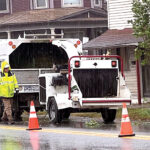Mayor backs appeal of DEP permit
DAVIS — Grassroots leaders and political officials in Tucker County say many of the county’s residents are glad an appeal has been filed regarding the state Department of Environmental Protection approval of an air quality permit for a proposed data center and power plant.
Fundamental Data’s permit application for the proposed 500-acre natural gas power plant fueling a data center, which would be located between the towns of Davis and Thomas, was received by the DEP in March and then approved on Aug. 13.
An evidentiary hearing for the appeal before the West Virginia Air Quality Board is set for Nov. 5.
Appalachian Mountain Advocates filed the appeal on behalf of the local grassroots organization Tucker United and the environmental groups West Virginia Highland Conservancy and Sierra Club.
Tucker United member Nikki Forrester Forrester told The Inter-Mountain this week that representatives of the three organizations met several months ago and decided to come together to fight the proposed plant.
“We all realized that we shared similar concerns about this facility and how it would impact Tucker County,” Forrester said. “Tucker United is a non-partisan group and we are not an environmental group, but in this case we realized that we were all aligned in terms of opposing this facility, particularly around the air pollution that would be produced and the rift to our water sources in terms of this facility likely using millions of gallons of water. And the potential of pollutants spilling into our watershed.”
Davis Mayor Al Tomson said that his town, along with Thomas, will be the most affected if the plant is built. He noted that a majority of the people in those two communities are glad the appeal was filed.
“I think the people who are supportive of not having the power plant built are supportive of the appeal,” Tomson told The Inter-Mountain this week. “It’s another step to try and stop the power plant initiative from happening.”
He added that most of the support for the plant in Tucker County is coming from residents who don’t live in the county.
“In Tucker County, the majority of the people who are supportive of the plant live in Parsons, so they are 10 or 12 miles away,” Tomson said. “So I think it really depends on where you live and the area you care about, whether or not you’re supportive or not supportive of the power plant construction.”
Forrester said there are several reasons why the appeal was filed.
“The most significant reason is that we believe the WVDEP inappropriately classified the facility as a synthetic minor source of emissions instead of a major source,” Forrester said. “And that designation is really important because it means that the company can basically skirt a lot of regulations and avoid doing an Air Dispersion Model of the pollutants, and not have to do an Environmental Impact Assessment.”
Forrester said, based on what is publicly known about the proposed facility, it would be the third or fourth largest of its kind in the state of West Virginia.
“The numbers that were calculated, and that we saw in the air permit, are so close to pushing it over that threshold, it looked like the company behind it (Fundamental Data) avoided including certain admissions that would have pushed it over that threshold,” Forrester said.
“So, one of our members did an assessment of 80 power plant facilities in a nine-state area, including West Virginia, that were above 250 megawatt capacity, and of those 80 not a single one is classified as a synthetic minor source. Every single one is a major source, and so that just raises some red flags to say, why did the DEP approve this as a synthetic minor source when every single other plant of this size in the surrounding areas is considered a major source.”
Forrester said another major issue is the DEP allowing critical information in the permit about the types and amounts of air pollutants to be listed as “confidential business information.”
“West Virginia state law says that no person is allowed to keep confidential information about the types and amounts of air pollution,” Forrester said. “So, that was another one of the reasons why we filed the appeal.
“The air permit also does not require them to conduct necessary emissions monitoring and it failed to require them to do pollution modeling, even though it was in the purview of the DEP to conduct, but they said because it’s a synthetic minor, they don’t have to do that analysis.”


